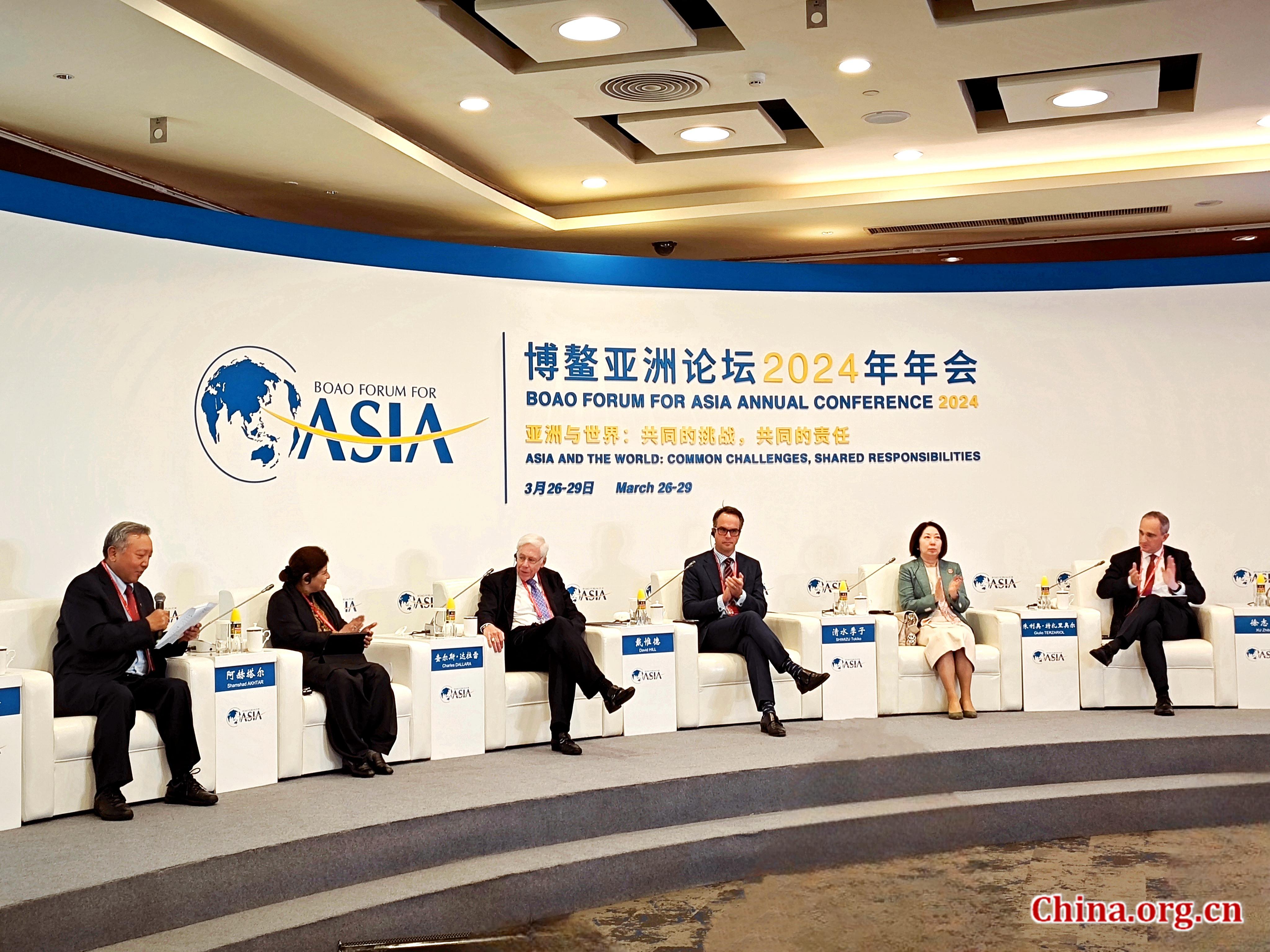
 0 Comment(s)
0 Comment(s) Print
Print E-mail China.org.cn, March 30, 2024
E-mail China.org.cn, March 30, 2024
A view of the Boao Forum for Asia (BFA) International Conference Center in Boao, south China’s Hainan province, March 28, 2024. [Photo by Wang Yiming/China.org.cn]
"I enjoy visiting China because of the energy, talent and entrepreneurial spirit that create so many opportunities to innovate and collaborate on our shared commitments," said Pascal Soriot, CEO of British biopharmaceutical giant AstraZeneca, on March 28 during the Boao Forum for Asia (BFA) Annual Conference 2024 in south China's Hainan province.
This is Soriot's sixth visit to China in the last 15 months. Supported by the Healthy China 2030 initiative and the good business environment, Chinese biopharmaceutical innovation has reached global significance, the CEO said.
During the last year, AstraZeneca has partnered with seven Chinese companies, signing deals worth a total of over US$6 billion, to bring their innovations to the world. Just a few days ago, it signed a memorandum of understanding with Minhai Biotechnology and Beijing’s Daxing district on the development, manufacturing and commercialization of vaccines.
"With Shanghai now one of our global strategic sites, we are well-placed to accelerate the role China plays in our company and in the global industry," Soriot said.

A panel discussion on "Investing the Future of Asia" during the Boao Forum for Asia (BFA) Annual Conference, March 26, 2024. [Photo by Wang Yiming/China.org.cn]
Similar to Pascal Soriot, many business leaders attending the BFA have voiced their enduring interest in the Chinese market and their confidence in the Chinese economy.
Charles Dallara, a member of the Board of Directors of Partners Group and the former managing director of the Institute of International Finance, said: "I think China is still a wonderful country to consider investment. My company has several investments here already, and we intend to continue looking."
"In China, we are always looking at opportunities," he added. "We recently invested in a logistics company headquartered in Singapore, but it does most of its business in China."
According to the Asia Economic Outlook and Integration Process Annual Report 2024 released on Tuesday, China will remain a major contributor to global economic growth, with the entire world benefiting from its massive market.
Some 7,160 new foreign-invested firms were set up across China during the first two months of this year, marking a 34.9% increase year on year, data from the Ministry of Commerce showed last Friday.
"There's a lot of talk about the reduction in foreign direct investment in China and China's growth is slow. But it's still 5% on an enormous economy. And that can produce an amazing amount of economic growth in the world," said David Hill, CEO of Asia Pacific at Deloitte.
Hill also highlighted Asia's role in vital investments that are imperitive to the future of the world, for example, in addressing climate change, citing China's significant contributions to renewable energy.
David Olsson, the national president and chair of the Australia China Business Council, highlighted the cooperation opportunities arising from China's energy transition.
"Australia is now moving towards its energy transition. We want to buy electric vehicles, and Chinese electric vehicles are increasingly being sold in Australia," he noted.
Regarding China's economic outlook, he emphasized its global significance, stating: "The Chinese economy is hugely important to the whole world. It's the driver of much of the economic growth in most nations around the world." Olsson also highlighted the importance of understanding China's economic restructuring and expressed interest in collaborating more closely with China in the long term.
China has rolled out a series of policies to attract more foreign investment. Last year, it issued the Opinions of the State Council on Further Optimizing the Foreign Investment Environment and Intensifying Efforts to Attract Foreign Investment.
This year's government work report stresses further shortening the negative list for foreign investment. It says that all market access restrictions on foreign investment in manufacturing will be abolished, while restrictions in services sectors, such as telecommunications and healthcare, will be reduced.
Earlier this month, the country launched an action plan proposing 24 measures across the five aspects of expanding market access, enhancing appeal to foreign investment, fostering a level playing field, facilitating the flow of innovation factors, as well as better aligning domestic rules with high-standard international economic and trade rules.
"I think that it's getting more attractive to invest in China as China is making changes," said Dr. Carl F. Fey, a professor of strategy at BI Norwegian Business School.
According to Fey, one of the most important factors has been improvements in intellectual property rights laws, while it is also encouraging that China has reduced the number of industries that foreign companies are restricted from operating in.
"Chinese laws have improved a lot, but one of the things that China needs to work on is not only to change the laws, but to make sure people around the world know that laws have changed," he said.
Coinciding with the first day of this year's BFA on March 26, the "Invest In China" Summit 2024 event was held in Beijing. Ling Ji, the vice commerce minister of China, delivered a speech at the summit introducing the implementation and effectiveness of a raft of policies to stabilize foreign investment.
He stated that China will continue to reduce the negative list for foreign investment access, focus on addressing issues of concern to foreign-invested enterprises, and effectively ensure the national treatment for them.
Go to Forum >>0 Comment(s)